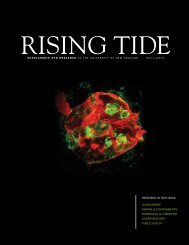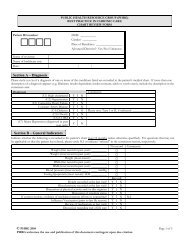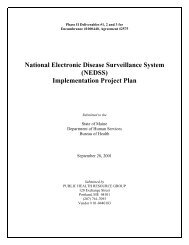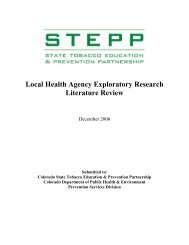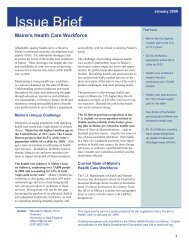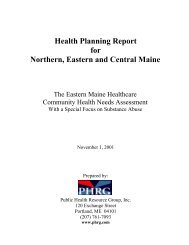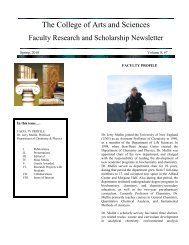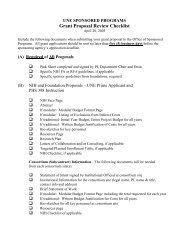Acute Flaccid Paralysis Accompanying West Nile Meningitis Ahmed ...
Acute Flaccid Paralysis Accompanying West Nile Meningitis Ahmed ...
Acute Flaccid Paralysis Accompanying West Nile Meningitis Ahmed ...
Create successful ePaper yourself
Turn your PDF publications into a flip-book with our unique Google optimized e-Paper software.
Chronic Mesenteric Ischemia In Severe Atherosclerotic Disease<br />
Abigail E. Keene, OMSIII<br />
University of New England College of Osteopathic Medicine, Biddeford, Maine<br />
Introduction: It is imperative to recognize that chronic mesenteric ischemia may be the<br />
manifestation of diffuse underlying vascular disease. Our patient presented only with<br />
post-prandial abdominal pain, nausea and an associated weight loss. After extensive<br />
work-up, she was found to have diffuse atherosclerotic disease with coronary, aortic and<br />
mesenteric involvement and an extensive collateral circulation.<br />
Case: A 77-year old woman presented to our hospital with a two-month history of postprandial<br />
abdominal pain associated with, nausea, loose stools and a 15 pound weight<br />
loss. This patient had been evaluated at multiple hospitals for the same symptoms with<br />
no definitive diagnosis.Vital signs on admission were temperature 97.9ºF, heart rate 91<br />
and regular, respiratory rate 18, blood pressure 96/54 mmHg, and oxygen saturation<br />
98% on room air. Laboratory studies were significant only for an elevated Troponin I<br />
level of 1.39ug/L to 1.52ug/L and a mildly elevated CK-MB fraction of 3.8. Cardiology<br />
and Surgery consults were obtained. Serial 12-lead EKGs, an echocardiogram with color<br />
Doppler, and a nuclear medicine stress test confirmed the presence of an NSTEMI with<br />
severe coronary artery disease. A Doppler ultrasound of the lower extremities revealed<br />
significant bilateral arterial insufficiency. An MRA with IV contrast of the abdomen was<br />
performed and the results were impressive. The test revealed complete occlusion of the<br />
infra-renal aorta, superior mesenteric artery and inferior mesenteric artery with the entire<br />
small and large bowel being perfused by collaterals from the celiac axis which was itself<br />
narrowed. Due to these findings, the patient was a poor candidate for open surgery.The<br />
patient was kept nothing by mouth (NPO), kept on <strong>Acute</strong> Coronary Syndrome (ACS)<br />
protocol and was sent to the cardiac catheterization lab where angiography of the<br />
coronaries and other major vessels was done. At this time, percutaneous transluminal<br />
angioplasty (PTA) of the right subclavian artery was also performed. On day three,<br />
vascular surgery attempted angioplasty with stent placement of the celiac artery but was<br />
not successful due to severe stenosis of the aorta. During her stay, she continued to<br />
have periodic, resolving, supraventricular contractions with mild hypotensive episodes<br />
that the patient was unaware of. Upon stabilization, the patient was discharged to followup<br />
as an outpatient and to return for angioplasty. A repeat attempt to stent the celiac<br />
artery was successfully completed one month later. The patient is currently reported to<br />
be stable with improved symptoms. Future procedures to relieve extensive stenosis may<br />
be required but medical management is preferred at this point in time.<br />
Discussion: Diffuse and severe atherosclerotic disease may present with few<br />
symptoms but poses a large risk of future vascular events including; myocardial<br />
infarction, mesenteric ischemia, cerebrovascular accidents, ischemic extremity and<br />
organ hypo-perfusion, necrosis and failure. Furthermore, Coronary artery disease with<br />
reduced cardiac function may decrease blood perfusion to already narrowed vessels,<br />
exacerbating tissue hypoxia. In patients like this, who present with post-prandial<br />
abdominal pain, extensive work-up must be done with a high index of suspicion for<br />
mesenteric ischemia. If stenosis is severe, revascularization procedures may be<br />
performed to avoid potential bowel infarction and death.



